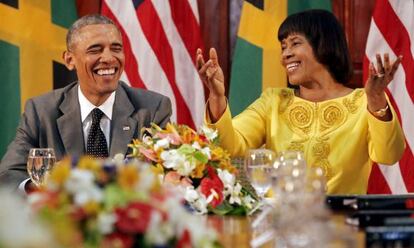Obama seeking to patch up relations with Latin America at regional summit
US president will use Cuba as example to show leaders Washington is open to dialogue


Buoyed by his far-reaching nuclear pact with Iran and the initiation of talks with Cuba, US President Barack Obama on Thursday night arrived in Panama where he is expected to try to begin patching up his country’s rocky relations with the rest of the continent at a meeting of regional leaders.
The Seventh Summit of the Americas – held every three years in different countries – will be Obama’s last before he leaves office in 2017. It may also be his final chance to explain his doctrine of dialogue, diplomacy and multilateral relations to a region that feels it has been continuously battered by its neighbor to the north.
Obama wants to show that his country is willing to bury decades of mistrust with its southern neighbors
While these real or imaginary grievances by Latin American and Caribbean governments are important pieces in the geopolitical game board, resolving them will be no easy task.
But with the opening of diplomatic relations with Cuba, Obama wants to show the region that his country is willing to bury decades of mistrust with its southern neighbors.
“We are all Americans,” Obama said on December 17 when he made the historic announcement that Washington and Havana had agreed to begin talks on normalizing relations.
Since he came to office in 2009, Obama has never held such an advantage in Latin America. But Washington’s ongoing tensions with the Venezuelan government demonstrate that the Cold War in the Western Hemisphere is not over. It is doubtful a solution will be hammered out during the two-day summit in Panama.
Nevertheless, the meeting of regional leaders will provide ample opportunities for both Obama and Cuban President Raúl Castro to show the world they are on the road to reconciliation.
The Obama administration’s strategy is aimed at removing an “irritant” issue that has hampered relations with many Latin American nations.
“This is going to open doors in the region that have been closed to the United States for many years,” said Democratic US Senator Tim Kaine in a telephone interview.
“There is going to be a different atmosphere at the summit in Panama than there has been at other summits and that is because of the dialogue process with Cuba.”
In February, the senator from Virginia traveled to Colombia, Honduras and Mexico where officials all gave him the same message: “It is important to the relationship between the United States and other Latin American countries to have a channel open for a dialogue with Cuba.”
Michael Shifter, president of the think-tank Inter-American Dialogue, believes that Obama’s decision about Cuba is the US’s boldest “symbolic political move” relating to Latin America since Jimmy Carter negotiated the Panama Canal treaty in 1977.
Shifter said that closer relations with Cuba “creates a more open environment, with less mistrust toward Latin America.”
Now that Cuba is no longer an “irritant” factor, Venezuela has appeared on the radar screen
“That doesn’t mean that suspicions and resentment, which have their historic roots, will disappear. It is a little bit unrealistic that one decision can change the relationship by 100 percent,” he said.
But now that Cuba is no longer an “irritant” factor, Venezuela has appeared on the radar screen.
Obama’s executive order on March 9 sanctioning seven Venezuelan officials for human rights violations and public corruption has received little support from Latin American governments. In fact, the US president received more criticism for his order than Venezuelan President Nicolás Maduro got for jailing opposition leaders.
Days before the summit, Washington tried to tone down the bilateral differences by sending a top US State Department official to Caracas. The White House is trying to avoid a situation where the attention at the summit is focused on Maduro.
“We are trying to present Obama’s legacy in the Americas as a leader interested in dialogue, in issues that affect everyday life in the Americas and in initiatives that improve the lives of citizens throughout the Americas,” said Ricardo Zúniga, a Honduran who serves as senior director for Western Hemisphere Affairs at the National Security Council, on the eve of the summit.
Tu suscripción se está usando en otro dispositivo
¿Quieres añadir otro usuario a tu suscripción?
Si continúas leyendo en este dispositivo, no se podrá leer en el otro.
FlechaTu suscripción se está usando en otro dispositivo y solo puedes acceder a EL PAÍS desde un dispositivo a la vez.
Si quieres compartir tu cuenta, cambia tu suscripción a la modalidad Premium, así podrás añadir otro usuario. Cada uno accederá con su propia cuenta de email, lo que os permitirá personalizar vuestra experiencia en EL PAÍS.
¿Tienes una suscripción de empresa? Accede aquí para contratar más cuentas.
En el caso de no saber quién está usando tu cuenta, te recomendamos cambiar tu contraseña aquí.
Si decides continuar compartiendo tu cuenta, este mensaje se mostrará en tu dispositivo y en el de la otra persona que está usando tu cuenta de forma indefinida, afectando a tu experiencia de lectura. Puedes consultar aquí los términos y condiciones de la suscripción digital.








































